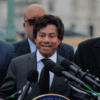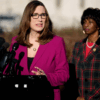There are six key elements to a successful federal government budget, including the plan released today by House Budget Committee chairman Paul Ryan (R—WI):
- Does it cut spending sharply and quickly?
- Does it begin decisive entitlement reform?
- Does it avoid any tax hikes?
- Does it ensure a strong national defense?
- Does it contain pro-growth tax reforms?
- Does it move swiftly and surely to a balanced budget?
Spending has soared under President Obama, so cutting spending is indispensable to resolving the nation’s unsustainable budget practices. But establishing lower spending numbers alone will not get the job done. Each element of the budget should stand as an integral component of a comprehensive, transformative budget backed by specific policies achieving lower spending. Ryan’s budget should be evaluated on how well it delivers on getting to balance swiftly without relying on budget gimmicks or tax hikes and backed by clearly described policy reforms.
The Ryan budget—titled The Path to Prosperity: A Blueprint for American Renewal—features strong, substantive, market-based reforms to the health entitlements and a solid, growth-oriented tax plan. It cuts spending, in the budget year of 2013 and into the future, from both discretionary accounts and entitlements.
This budget is not perfect. Few consensus political documents can be. It should be bolder in implementing its entitlement reforms. It should strive for more aggressive spending reductions. It is slow to reach balance, largely the consequence of avoiding Social Security reforms and slowly phasing in health entitlement reforms. But like its predecessor a year ago, the Ryan budget substantially advances the serious and necessary conversation about securing America’s future and its great legacy of freedom, opportunity, and self government.
The Ryan budget shares the basic philosophy of The Heritage Foundation’s plan, Saving the American Dream. Ryan’s plan is a vast improvement over the situation in the Senate, where Majority Leader Harry Reid (D–NV) has once again refused even to allow a budget on the floor. It is far better than President Obama’s budget, which relies on enormous tax hikes, shirks any solutions to the twin crises of excessive spending and soaring debt, and never comes close to balance.
Ryan has put forth a serious plan worthy of serious consideration. His budget lays out substantive policy choices, cutting spending, reforming entitlements, and avoiding tax hikes. It also outlines a tax reform that would strengthen the economy and by implication further strengthen government finances through organic revenue growth. It represents real progress toward tackling the nation’s fiscal and economic challenges. Congress and the President should now move toward a real consensus that achieves all the Ryan plan suggests and more.































14 Replies to “First Reactions to Ryan’s Path to Prosperity Budget”